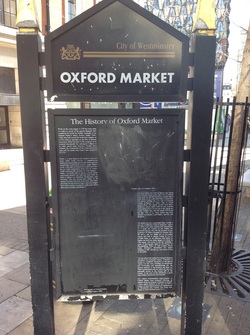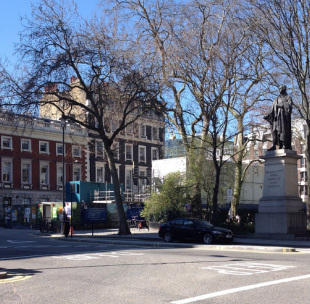London – a thriving financial, political and cultural powerhouse. Oxford Street – a shopping paradise, nearly always packed. Lately, I’ve been exploring the movement of learned societies around the West End. My first post was about Egyptian Hall, on Piccadilly, where Flinders Petrie held his 1888 exhibition of antiquities from Hawara, Egypt. Petrie also displayed objects in the Royal Archaeological Institute’s rooms in Oxford Mansions, a block of flats (now demolished) just off of Oxford Street.
Oxford Mansions had been built on the site of an 18th century market square, named for the Earl of Oxford. From the market’s central building vegetables, meat and fish were sold. The market closed in the 1870s, its building was torn down and the red brick Mansions built in its place. (A brief history of the Oxford Market and an image of the market building can be found here.)

At Oxford Mansions, the RAI hosted several of Petrie’s exhibitions in the 1880s and early 1890s. The objects on display changed from season to season depending on where Petrie had been excavating, so visitors were able to see recently excavated artefacts from the Delta (Lower Egypt) at Tanis (San) and Naukratis; from Lahun in the Fayoum and from further up the Nile at Amarna, displayed just a stone's throw from the shops of Oxford Street.
 A view of the brown brick No. 20 Hanover Square, London.
A view of the brown brick No. 20 Hanover Square, London. It’s clear from the street directories and other books on London’s past that the city and its institutions were always shifting, always in motion. The history of London’s learned societies can tell us a lot about changing priorities as well as a changing landscape, particularly for those that are still dependent on subscription and membership for their continued success today. Public lectures and exhibitions remain a widely used strategy to engage current members and attract new audiences – but for how long?
References/Futher Reading
Kelly & Co. Ltd. 1882. Post Office London Directory (Part 1: Official and Street Directories). London: Kelly & Co. Ltd.
Kelly & Co. Ltd. 1895. Post Office London Directory for 1895 (Part 2: Street Directory). London: Kelly & Co. Ltd.
Loftie, W. J. 1883. A History of London. Vol II. London: Edward Stanford.
RAI [Royal Archaeological Institute]. 1880. Report of the Council 1879-1880. Archaeological Journal 37: 432-434.
UCL [University College London]. 2002. The Archaeological Record: Flinders Petrie in Egypt. Digital Egypt in Universities.
Wheatley, H. B. & Cunningham, P. 1891 [2011]. London Past and Present: Its History, Associations and Traditions. Cambridge: Cambridge University Press.

 RSS Feed
RSS Feed